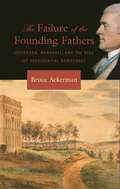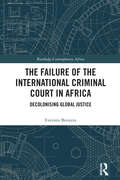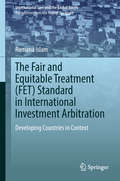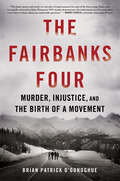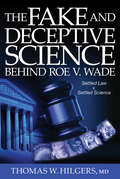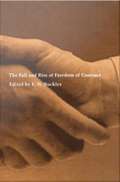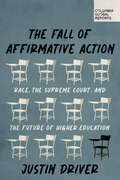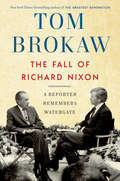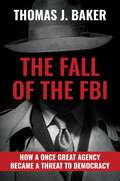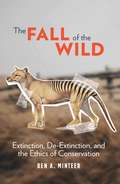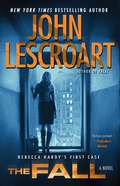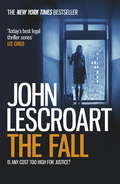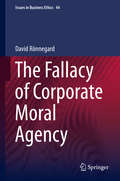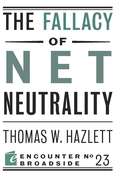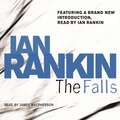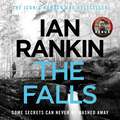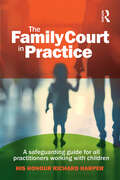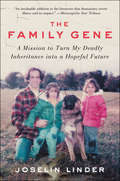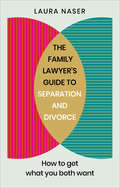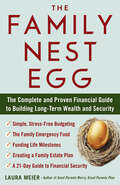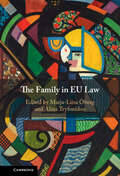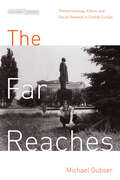- Table View
- List View
The Failure of the Founding Fathers: Jefferson, Marshall, And The Rise Of Presidential Democracy
by Bruce ACKERMANBased on seven years of archival research, the book describes previously unknown aspects of the electoral college crisis of 1800, presenting a revised understanding of the early days of two great institutions that continue to have a major impact on American history: the plebiscitarian presidency and a Supreme Court that struggles to put the presidency's claims of a popular mandate into constitutional perspective. Through close studies of two Supreme Court cases, Ackerman shows how the court integrated Federalist and Republican themes into the living Constitution of the early republic.
The Failure of the International Criminal Court in Africa: Decolonising Global Justice (Routledge Contemporary Africa)
by Everisto BenyeraThis book investigates the relationship between the International Criminal Court and Africa, asking why and how the international criminal justice system has so far largely failed the victims of atrocities in Africa. The book explores how the Court degenerated from a very promising multilateral institution to being an instrumentalized, politicized, weaponized institution which ended up with the victims being the greatest losers. Instead of looking at the International Criminal Court as a recent alternative to the prevailing paradigm, that book argues that it is a manifestation of the same world order that was established by the Reconquista in 1492. Written from a decolonial perspective, the book particularly draws on evidence from Zimbabwe in order to demonstrate how the International Criminal Court is failing the victims of the four crimes that falls under its jurisdiction. Drawing on the perspectives of victims in particular, this book highlights the damage caused within Africa by the international justice system and argues for a decolonial concept of justice. It will be of interest to researchers from across African politics, international relations, law, and criminal justice.
The Fair and Equitable Treatment: Developing Countries in Context (International Law and the Global South)
by Rumana IslamThis book presents comprehensive information on a range of issues in connection with the Fair and Equitable Treatment (FET) standard, with a particular focus on arbitral awards against host developing countries, thereby contributing to the available literature in this area of international investment law. It examines in detail the interpretation of the FET standard of key arbitral awards affecting host developing countries, demonstrating the full range of interpretation approaches adopted by the current investment tribunals. At the same time, the book offers valuable practical guidance for counsels/scholars representing host developing countries in investment arbitration, where balancing the competing interests of the foreign investors and the host developing countries in investment disputes poses a complex challenge. The book puts forward the pressing need for a re-conceptualized interpretation of the FET standard in tune with the developmental issues and challenges faced by host developing countries, recognizing these countries’ particular perspectives as an important and relevant aspect of investment disputes (often ignored by the current investment tribunals), while continuing to ensure reasonable protections for foreign investors and therefore serving the needs of the system as whole. The findings presented here will greatly benefit host developing countries engaged in investment arbitration. In addition, the book offers an insightful guide for all researchers whose work involves investment law and investment arbitration issues.
The Fairbanks Four: Murder, Injustice, and the Birth of a Movement
by Brian Patrick O’DonoghueOne murder, four guilty convictions, and a community determined to find justice.October, 1997. Late one night in Fairbanks, Alaska, a passerby finds a teenager unconscious, collapsed on the edge of the road, beaten nearly beyond recognition. Two days later, he dies in the hospital. His name is John Gilbert Hartman and he's just turned 15 years old. The police quickly arrest four suspects, all under the age of 21 and of Alaska Native and American Indian descent. Police lineup witnesses, trials follow, and all four men receive lengthy prison terms. Case closed. But journalist Brian Patrick O'Donoghue can't put the story out of his mind. When the opportunity arises to teach a class on investigative reporting, he finally digs into what happened to the "Fairbanks Four." A relentless search for the truth ensues as O'Donoghue and his students uncover the lies, deceit, and prejudice that put four innocent young men in jail.The Fairbanks Four is the gripping story of a brutal crime and its sprawling aftermath in the frigid Alaska landscape. It's a story of collective action as one journalist, his students, and the Fairbanks indigenous community challenge the verdicts. It's the story of a broken justice system, and the effort required to keep hope alive. This is the story of the Fairbanks Four.
The Fake and Deceptive Science Behind Roe V. Wade: Settled Law? vs. Settled Science?
by Thomas W. HilgersOur schools and healthcare institutions have abandoned the Hippocratic Oath and the Declaration of Geneva and replaced it with a policy of lethalism ...This is a direct result of the Court's acceptance and promotion of archaic scientific reasoning (Roe v. Wade) that, at best, would be considered pre-medieval and clearly out of touch with scientific reality. Fallout includes the expansion into fetal experimentation, human cloning, embryonic stem cell research, infanticide, and even physician-assisted suicide programs. The respect for life ethic has slowly been removed as the Supreme Court has so strongly supported the "lethalism becomes a way of life" ethic. Especially interesting is the lack of support for any positive solutions to these issues.The recognition is that life at all stages in the womb is precious and able to make extraordinary contributions to our ability to love and to be loved, to bring about peace and to be at peace, to extract love in ways that only a very young and precious life is able to extract, and to express love in ways that can be boundlessly meaningful. As we move to reestablish the human right to live, we must also move beyond lethalism and install positive, life-affirming and meaningful solutions to real human problems.God bless us all as we move in this direction!
The Fall and Rise of Freedom of Contract
by F. H. BuckleyDeclared dead some twenty-five years ago, the idea of freedom of contract has enjoyed a remarkable intellectual revival. In The Fall and Rise of Freedom of Contract leading scholars in the fields of contract law and law-and-economics analyze the new interest in bargaining freedom. The 1970s was a decade of regulatory triumphalism in North America, marked by a surge in consumer, securities, and environmental regulation. Legal scholars predicted the "death of contract" and its replacement by regulation and reliance-based theories of liability. Instead, we have witnessed the reemergence of free bargaining norms. This revival can be attributed to the rise of law-and-economics, which laid bare the intellectual failure of anticontractarian theories. Scholars in this school note that consumers are not as helpless as they have been made out to be, and that intrusive legal rules meant ostensibly to help them often leave them worse off. Contract law principles have also been very robust in areas far afield from traditional contract law, and the essays in this volume consider how free bargaining rights might reasonably be extended in tort, property, land-use planning, bankruptcy, and divorce and family law. This book will be of particular interest to legal scholars and specialists in contract law. Economics and public policy planners will also be challenged by its novel arguments. Contributors. Gregory S. Alexander, Margaret F. Brinig, F. H. Buckley, Robert Cooter, Steven J. Eagle, Robert C. Ellickson, Richard A. Epstein, William A. Fischel, Michael Klausner, Bruce H. Kobayashi, Geoffrey P. Miller, Timothy J. Muris, Robert H. Nelson, Eric A. Posner, Robert K. Rasmussen, Larry E. Ribstein, Roberta Romano, Paul H. Rubin, Alan Schwartz, Elizabeth S. Scott, Robert E. Scott, Michael J. Trebilcock
The Fall of Affirmative Action: Race, the Supreme Court, and the Future of Higher Education
by Justin DriverFor decades, affirmative action reshaped not just American higher education but the broader society, opening doors that had been closed for centuries and transforming who entered the pathways to power. But the Supreme Court in 2023 killed affirmative action in Students for Fair Admissions v. Harvard, a decision hailed by the right as a triumph of conservative colorblindness and decried by the left as requiring the end of racial equity. Both sides, Yale Law School professor Justin Driver contends, are wrong. <P><P> Perversely, even when viewed through a conservative lens, the Court’s decision ushers in a less desirable admissions regime. The post-SFFA model places a new premium on students of color voicing their racial trauma in elaborate application essays, entrenching the very racial victimization and essentialism that conservatives purport to loathe. The Trump Administration’s assault on higher education has been fueled by distorted readings of SFFA, further clouding the opinion’s already opaque meaning. But SFFA, properly understood, leaves universities significant legal room to combat Trump’s anti-D.E.I. onslaught by adopting innovative policies that foster diversity—including preferences for descendants of slavery, members of tribes, and applicants from blighted communities. <P><P> Far from a mere eulogy, The Fall of Affirmative Action provides a blueprint for the future—a rallying cry for citizens to forge new paths to inclusion and push back against the notion that racial equity is doomed. The death of affirmative action, Driver insists, need not mean the death of opportunity.
The Fall of Richard Nixon: A Reporter Remembers Watergate
by Tom BrokawBestselling author Tom Brokaw brings readers inside the White House press corps in this up-close and personal account of the fall of an American president. In August 1974, after his involvement in the Watergate scandal could no longer be denied, Richard Nixon became the first and only president to resign from office in anticipation of certain impeachment. The year preceding that moment was filled with shocking revelations and bizarre events, full of power politics, legal jujitsu, and high-stakes showdowns, and with head-shaking surprises every day. As the country’s top reporters worked to discover the truth, the public was overwhelmed by the confusing and almost unbelievable stories about activities in the Oval Office. Tom Brokaw, the young NBC News White House correspondent at the time, gives us a nuanced and thoughtful chronicle, recalling the players, the strategies, and the highs and lows of the scandal that brought down a president. He takes readers from crowds of shouting protesters to shocking press conferences, from meetings with Attorney General Elliot Richardson and White House Chief of Staff Alexander Haig, to overseas missions alongside Henry Kissinger. He recounts Nixon’s claims of executive privilege to withhold White House tape recordings of Oval Office conversations; the bribery scandal that led to the resignation of Vice President Spiro Agnew and the choice of Gerald Ford as VP; the firing of Special Prosecutor Archibald Cox; how in the midst of Watergate Nixon organized emergency military relief for Israel during the Yom Kippur war; the unanimous decision of the Supreme Court that required Nixon to turn over the tapes; and other insider moments from this important and dramatic period and event. The Fall of Richard Nixon allows readers to experience this American epic from the perspective of a journalist on the ground and at the center of it all during this historic time.Advance praise for The Fall of Richard Nixon “A divided nation. A deeply controversial president. Powerful passions. No, it’s not what you’re thinking, but Tom Brokaw knows that the past can be prologue, and he’s given us an absorbing and illuminating firsthand account of how Richard Nixon fell from power. Part history, part memoir, Brokaw’s book reminds us of the importance of journalism, the significance of facts, and the inherent complexity of power in America.”—Jon Meacham, Pulitzer Prize–winning author of The Soul of America
The Fall of the FBI: How a Once Great Agency Became a Threat to Democracy
by Thomas J. BakerAn FBI veteran explains how the Mueller–Comey cabal turned the FBI from a &“swear to tell the truth&” law-enforcement agency to a politicized intelligence organization.Americans have lost faith in the Federal Bureau of Investigation, an institution they once regarded as the world&’s greatest law-enforcement agency. Thomas Baker spent many years with the FBI and is deeply troubled by this loss of faith. Specific lapses have come to light and each is thoroughly discussed in this book: Why did they happen? What changed? The answer begins days after the 9/11 attacks when the FBI underwent a significant change in culture. To understand how far the Bureau has fallen, this book shows the crucial role played by the FBI and its agents in past decades. It was quite often, as the reader will see from these firsthand experiences, a fun-filled adventure with exciting skyjackings, kidnappings, and bank robberies. At the same time, the reader will see the reverence the Bureau had for the Constitution and the concern agents held for the rights of each American. This book is not mere memoir—it is history. From the shooting of President Reagan and the death of Princess Diana to the TWA 800 crash and even getting marching orders from St. Mother Teresa, Baker&’s story shows how the FBI has played a pivotal role in our country&’s history.
The Fall of the Wild: Extinction, De-Extinction, and the Ethics of Conservation
by Ben A. MinteerThe passenger pigeon, the great auk, the Tasmanian tiger—the memory of these vanished species haunts the fight against extinction. Seeking to save other creatures from their fate in an age of accelerating biodiversity loss, wildlife advocates have become captivated by a narrative of heroic conservation efforts. A range of technological and policy strategies, from the traditional, such as regulations and refuges, to the novel—the scientific wizardry of genetic engineering and synthetic biology—seemingly promise solutions to the extinction crisis.In The Fall of the Wild, Ben A. Minteer calls for reflection on the ethical dilemmas of species loss and recovery in an increasingly human-driven world. He asks an unsettling but necessary question: Might our well-meaning efforts to save and restore wildlife pose a threat to the ideal of preserving a world that isn’t completely under the human thumb? Minteer probes the tension between our impulse to do whatever it takes and the risk of pursuing strategies that undermine our broader commitment to the preservation of wildness. From collecting wildlife specimens for museums and the wilderness aspirations of zoos to visions of “assisted colonization” of new habitats and high-tech attempts to revive long-extinct species, he explores the scientific and ethical concerns vexing conservation today. The Fall of the Wild is a nuanced treatment of the deeper moral issues underpinning the quest to save species on the brink of extinction and an accessible intervention in debates over the principles and practice of nature conservation.
The Fall: A Novel (Dismas Hardy #16)
by John LescroartA “courtroom thriller extraordinaire” (Providence Journal) from “master craftsman” (Associated Press) John Lescroart puts Dismas Hardy and his daughter in the middle of an uncertain murder case where winning the trial could mean losing everything.On a cool night in May, a teenage foster child named Anlya Paulson plummets to her death from a San Francisco overpass. But did she fall…or was she pushed? Homicide inspectors focus their attention on a likeable but naïve middle school teacher and volunteer foster care advocate. At first, his only connection to Anlya’s death is the meal they shared earlier that night. But soon his story falls apart, and Rebecca Hardy, now an associate at her father’s law firm, is drawn into his defense. As the case rushes toward trial, Dismas and Rebecca battle an aggressive prosecutor, a disinterested police force, and their own client, who isn’t faring well in jail. When a dying woman’s last words cast a surprising new light on the evidence and problems develop with a key witness, the father-daughter duo begins to glimpse the intricate web that connects the young victim to the city’s complex political and judicial machine. Proving their case in court, however, will be harder, as Rebecca comes to realize that a trial doesn’t always end with the truth.
The Fall: A complex and gripping legal thriller (Dismas Hardy Ser. #16)
by John LescroartFrom John Lescroart, New York Times bestselling author, comes The Fall - the riveting legal thriller featuring Dismas Hardy and introducing his daughter Rebecca. Perfect for fans of John Grisham and Michael Connelly.'The best legal thriller I have read in years' - Brad ThorLate one night, fostered teen Anlya Paulson plummets to her death from the overpass above San Francisco's Stockton tunnel.But did she fall...or was she pushed?Rushing to produce a suspect, homicide inspectors focus on naïve school teacher Greg Treadway, who volunteers as a Special Advocate for foster children. But by the time Greg's murder trial is underway, lawyer Dismas Hardy and his daughter, Rebecca, have unearthed some alternative harrowing possibilities: a missing stepfather, a roommate who ran an escort service, and even Anlya's own birth mother.How will they get these theories in front of the jury? And, if they can, what price will they have to pay?What readers are saying about The Fall:'The Fall is another brilliant example of why John Lescroart is one of the world's most popular authors of legal thrillers today''A murder mystery with many twists and turns and a totally unexpected ending''I feel as if I know these people, despite the fact they are fictional characters'
The Fallacy of Corporate Moral Agency
by David RönnegardIt is uncontroversial that corporations are legal agents that can be held legally responsible, but can corporations also be moral agents that are morally responsible? Part one of this book explicates the most prominent theories of corporate moral agency and provides a detailed debunking of why corporate moral agency is a fallacy. This implies that talk of corporate moral responsibilities, beyond the mere metaphorical, is essentially meaningless. Part two takes the fallacy of corporate moral agency as its premise and spells out its implications. It shows how prominent normative theories within Corporate Social Responsibility, such as Stakeholder Theory and Social Contract Theory, rest on an implicit assumption of corporate moral agency. In this metaphysical respect such theories are untenable. In order to provide a more robust metaphysical foundation for corporations the book explicates the development of the corporate legal form in the US and UK, which displays how the corporation has come to have its current legal attributes. This historical evolution shows that the corporation is a legal fiction created by the state in order to serve both public and private goals. The normative implication for corporate accountability is that citizens of democratic states ought to primarily make calls for legal enactments in order to hold the corporate legal instruments accountable to their preferences.
The Fallacy of Net Neutrality
by Thomas W Hazlett"There is little dispute that the Internet should continue as an open platform," notes the U.S. Federal Communications Commission. Yet, in a curious twist of logic, the agency has moved to discontinue the legal regime successfully yielding that magnificent platform. In late 2010, it imposed "network neutrality" regulations on broadband access providers, both wired and wireless. Networks cannot (a) block subscribers' use of certain devices, applications, or services; (b) unreasonably discriminate, offering superior access for some services over others. The Commission argues that such rules are necessary, as the Internet was designed to bar "gatekeepers." The view is faulty, both in it engineering claims and its economic conclusions. Networks routinely manage traffic and often bundle content with data transport precisely because such coordination produces superior service. When "walled gardens" emerge, including AOL in 1995, Japan's DoCoMo iMode in 1999, or Apple's iPhone in 2007, they often disrupt old business models, thrilling consumers, providing golden opportunities for application developers, advancing Internet growth. In some cases these gardens have dropped their walls; others remain vibrant. The "open Internet" allows consumers, investors, and innovators to choose, discovering efficiencies. The FCC has mistaken that spontaneous market process for a planned market structure, imposing new rules to "protect" what evolved without them.
The Falls
by Ian RankinThe twelfth Inspector Rebus bestseller - a powerfully gripping novel where past and present collide...From the No.1 bestselling author of A SONG FOR THE DARK TIMES'This is, quite simply, crime writing of the highest order' DAILY EXPRESS'The unopposed champion of the British police procedural' GUARDIANA student has gone missing in Edinburgh. She's not just any student, though, but the daughter of well-to-do and influential bankers. There's almost nothing to go on until DI John Rebus gets an unmistakable gut feeling that there's more to this than just another runaway spaced out on unaccustomed freedom. Two leads emerge: a carved wooden doll in a toy coffin, found in the student's home village, and an internet role-playing game. The ancient and the modern, brought together by uncomfortable circumstance...
The Falls (A Rebus Novel)
by Ian RankinThe twelfth Inspector Rebus bestseller - a powerfully gripping novel where past and present collide...From the No.1 bestselling author of A SONG FOR THE DARK TIMES'This is, quite simply, crime writing of the highest order' DAILY EXPRESS'The unopposed champion of the British police procedural' GUARDIANA student has gone missing in Edinburgh. She's not just any student, though, but the daughter of well-to-do and influential bankers. There's almost nothing to go on until DI John Rebus gets an unmistakable gut feeling that there's more to this than just another runaway spaced out on unaccustomed freedom. Two leads emerge: a carved wooden doll in a toy coffin, found in the student's home village, and an internet role-playing game. The ancient and the modern, brought together by uncomfortable circumstance...
The Falls: The number one bestselling series that inspired BBC One’s REBUS (A Rebus Novel)
by Ian RankinA student has gone missing in Edinburgh. She's not just any student, though, but the daughter of well-to-do and influential bankers. There's almost nothing to go on until DI John Rebus gets an unmistakable gut feeling that there's more to this than just another runaway spaced out on unaccustomed freedom. Two leads emerge: a carved wooden doll in a toy coffin, found in the student's home village, and an internet role-playing game. The ancient and the modern, brought together by uncomfortable circumstance...Read by James Macpherson(p) 2001 Orion Publishing Group
The Falls: The number one bestselling series that inspired BBC One’s REBUS (A Rebus Novel)
by Ian RankinA student has gone missing in Edinburgh. She's not just any student, though, but the daughter of well-to-do and influential bankers. There's almost nothing to go on until DI John Rebus gets an unmistakable gut feeling that there's more to this than just another runaway spaced out on unaccustomed freedom. Two leads emerge: a carved wooden doll in a toy coffin, found in the student's home village, and an internet role-playing game. The ancient and the modern, brought together by uncomfortable circumstance...Read by James Macpherson(p) 2015 Orion Publishing Group
The Family Court in Practice: A safeguarding guide for all practitioners working with children
by Richard HarperWritten by an experienced former senior judge of the family court, this practical guide provides all students and practitioners working with children with a clear understanding of safeguarding good practice and the principles and proceedings of the family court.Where there is serious risk of harm, it examines how all involved in the community or family court proceedings can place the child at the centre of their practical decision-making. Incorporating the most up-to-date legislation, and emphasising the importance of multi-agency working, the book enables practitioners, and all stakeholders, to better understand the workings of the family court and to recognise and implement appropriate actions. Fictional case studies with critical questions are included to encourage deep reflection and ways to apply new-found knowledge to practice. The book demystifies the family court to provide an accessible guide for students and both experienced and newly qualified practitioners.Chapters delve into the structure of the family court, preparing reports and statements, public and private court proceedings, giving evidence, and urgent interventions. The author's professional experience and expertise ensures readers are fully equipped with a unique and practical understanding for safeguarding the welfare of children within the family court system.
The Family Gene: A Mission to Turn My Deadly Inheritance into a Hopeful Future
by Joselin LinderA riveting medical mystery about a young woman’s quest to uncover the truth about her likely fatal genetic disorder that opens a window onto the exploding field of genomic medicineWhen Joselin Linder was in her twenties her legs suddenly started to swell. After years of misdiagnoses, doctors discovered a deadly blockage in her liver. Struggling to find an explanation for her unusual condition, Joselin compared the medical chart of her father—who had died from a mysterious disease, ten years prior—with that of an uncle who had died under similarly strange circumstances. Delving further into the past, she discovered that her great-grandmother had displayed symptoms similar to hers before her death. Clearly, this was more than a fluke. Setting out to build a more complete picture of the illness that haunted her family, Joselin approached Dr. Christine Seidman, the head of a group of world-class genetic researchers at Harvard Medical School, for help. Dr. Seidman had been working on her family’s case for twenty years and had finally confirmed that fourteen of Joselin’s relatives carried something called a private mutation—meaning that they were the first known people to experience the baffling symptoms of a brand new genetic mutation. Here, Joselin tells the story of their gene: the lives it claimed and the future of genomic medicine with the potential to save those that remain. Digging into family records and medical history, conducting interviews with relatives and friends, and reflecting on her own experiences with the Harvard doctor, Joselin pieces together the lineage of this deadly gene to write a gripping and unforgettable exploration of family, history, and love. A compelling chronicle of survival and perseverance, The Family Gene is an important story of a young woman reckoning with her father’s death, her own mortality, and her ethical obligations to herself and those closest to her.
The Family Lawyer’s Guide to Separation and Divorce: How to Get What You Both Want
by Laura NaserYour family lawyer in a book.Whether you are married or living together – with children or without, if you are thinking about or are in the process of splitting up, this book is for you. When a relationship breaks down it’s hugely stressful and emotional – and often very confusing. Who gets to keep what? Will I ever see my kids? What needs to happen and when? What if things get nasty? This all-encompassing book, by family lawyer Laura Naser with years of experience helping couples reach the best solution possible, is here to bring calm and clarity, whatever the situation. She will guide you through the entire process from making sure this is what you really want and knowing what’s at stake, through to detailing all your options (whether you are married or not), what to do and in what order, and with a specific focus on co-parenting, managing money, social media, effective communication and how to resolve tricky issues that come up along the way. See this book as your trusted companion and guide - everything you need to know to get through this and thrive is right here.
The Family Nest Egg: The Complete and Proven Financial Guide to Building Long-Term Wealth and Security
by Laura MeierLearn how to earn and save more money while protecting your finances and your family. Wouldn&’t it be great if life were perfect, or just predictable? Recent times have been anything but. With rising rents, expensive mortgages, student loans, debts, and dreams deferred, most of us parents found our lives far from perfect or predictable even before the global pandemic and economic turmoil. But with the right guidance and actionable advice, we can get ourselves closer―taking back our future, building wealth, and protecting our families against the worst unforeseen events. In The Family Nest Egg, estate planning attorney and parent Laura Meier provides a breakthrough program of inspiring real-life stories and time-tested legal, financial, and practical tips to move our families from stress to success and security. Let&’s get planning. • Build Your IF LIFE WERE PERFECT Vision • Follow the 21-Day Family Nest Egg Plan • Follow the Three Ps for Prosperity • Engage in a Budgeting P.E.A.C.E. Process • Invest, Build Wealth, and Fund Life Milestones • Create Your Family Emergency Fund • Find the Right Insurance and Asset Protection • Learn About Wills and Trusts • Build a Team of S.T.A.R. Financial and Estate Advisers&“Laura Meier&’s The Family Nest Egg gives parents the tools they need to find confidence, stop worrying, and secure the financial future for their loved ones. . . . A trustworthy resource.&” —Barbara Corcoran, founder of the Corcoran Group and Shark on ABC&’s Shark Tank
The Family in EU Law
by Alina Tryfonidou Marja-Liisa ÖbergThe volume provides a first-ever comprehensive account of the concept and the role of the family in EU law. It explores the family in EU law from four different angles. The first part of the book considers the philosophical and theoretical foundations of the family in the law in general, including the definition of the family under EU law. The second part provides an overview of the rights conferred upon the family by Union law and assesses whether these cater for the needs of all families. The third part of the book examines the EU family from the perspective of family diversity in comparison with the European Convention on Human Rights. Finally, the fourth part offers insights into how EU law deals with some situations of crisis that are faced by families in the EU. This title is also available as Open Access on Cambridge Core.
The Family in Law
by Archana Parashar Francesca DominelloThe Family in Law provides a jurisprudential analysis of current family law, connecting doctrinal discourse with sociological, historical and economic analyses of the institution of family. The law's focus on the nuclear family as the default model is central to the book's discourse, which contains in-depth discussions of the key areas of family law - marriage, divorce, children and property matters. Written for Australian legal actors - whether students, academics or professionals - readers are encouraged to question current frameworks, critique well-known cases and make informed conclusions on whether changes could be made to engender a fairer and more equitable society. In developing doctrinal analysis within a theoretical framework, The Family in Law challenges the conventional boundaries of family law, providing readers with both a solid foundation and a multi-layered perspective to their understanding of the topic.
The Far Reaches: Phenomenology, Ethics, and Social Renewal in Central Europe
by Michael GubserWhen future historians chronicle the twentieth century, they will see phenomenology as one of the preeminent social and ethical philosophies of its age. The phenomenological movement not only produced systematic reflection on common moral concerns such as distinguishing right from wrong and explaining the status of values; it also called on philosophy to renew European societies facing crisis, an aim that inspired thinkers in interwar Europe as well as later communist bloc dissidents. Despite this legacy, phenomenology continues to be largely discounted as esoteric and solipsistic, the last gasp of a Cartesian dream to base knowledge on the isolated rational mind. Intellectual histories tend to cite Husserl's epistemological influence on philosophies like existentialism and deconstruction without considering his social or ethical imprint. And while a few recent scholars have begun to note phenomenology's wider ethical resonance, especially in French social thought, its image as stubbornly academic continues to hold sway. The Far Reaches challenges that image by tracing the first history of phenomenological ethics and social thought in Central Europe, from its founders Franz Brentano and Edmund Husserl through its reception in East Central Europe by dissident thinkers such as Jan Patocka, Karol Wojtyla (Pope John Paul II), and Václav Havel.
